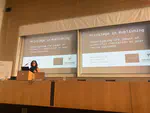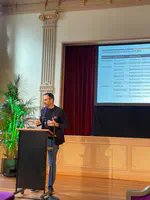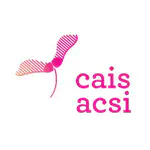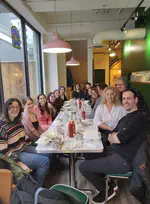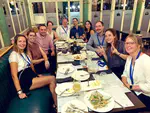Latest News & Blogs
Dalhousie University’s Ocean Frontier Institute launched the Transforming Climate Action (TCA) research program in 2023. Philippe Mongeon, one of the leads of Cluster 3.2, and members of the QSSLab will be involved in four work packages, in collaboration with Dalhousie’s Faculty of Computer Science and the Université du Québec à Rimouski.
Work Package 1: Oceans and climate: identifying knowledge and its structure
This work package has two main objectives: to identify scholarly literature on the role of oceans in relation to climate and to analyze the structure and evolution of this research over time using research clusters. It aims to build a global overview of ocean-climate research, supporting both internal projects and informing broader climate policy, like the IPCC reports. Through hierarchical clustering and machine learning, the project will classify knowledge within this corpus, creating tools for future research. Collaboration between Dalhousie University’s Information Science and Computer Science faculties will help ensure the development of a robust knowledge navigation and classification system.
Work Package 2: The evolution of scholarly and public attention toward ocean-climate research
This work package builds on WP1 by examining how ocean-climate research is mobilized across different platforms, including scientific literature, social media, news, policy, and educational materials. Its aim is to determine who engages with this knowledge, the contexts of its citations, and how different geographical or topical clusters generate attention. By mapping knowledge flows, this study will identify which research is visible to key organizations like NGOs and explore how knowledge is disseminated across different audiences. The project will also develop visualization tools to track the movement of knowledge and provide insights into how external events, such as COVID-19, affect knowledge structures, feeding into WP3’s analysis of the drivers of knowledge dissemination.
Work Package 3: The shaping of the ocean-climate research landscape
Work Package 3 focuses on understanding the evolution of ocean-climate research by analyzing knowledge flows over time, using bibliometrics and generative AI. It aims to identify how world events, political actions, and social shifts impact the production and dissemination of research, while also exploring hidden causalities in the knowledge landscape. The project will develop tools to assess gaps in the current knowledge base, predict future research directions, and generate targeted actions to address under-explored areas, with an emphasis on equity and inclusion. Generative AI will also be leveraged to hypothesize future knowledge flows, shape research initiatives, and support multi-language accessibility.
Work Package 4: Mapping curriculum and the scientific landscape
This work package builds on previous efforts to connect ocean and climate science with educational syllabi, focusing on Atlantic Canadian secondary and post-secondary educators. The project aims to analyze the gap between scientific literature and its representation in regional curricula, understand who is and isn’t represented in the scientific works used in education, and develop tools that help educators access relevant research. Through bibliometric analysis and information science methodologies, the project seeks to empower educators to effectively teach ocean-climate science, with particular emphasis on marginalized communities. Collaboration between Dalhousie University and UQAR will ensure interdisciplinary expertise, community partnerships, and the development of participatory, user-friendly tools.
To learn more about different research clusters within TCA and the program’s expected impact, visit the Ocean Frontier Institutes’ website.
The QSSLab presented several projects at the 28th International Conference on Science, Technology and Innovation Indicators, September 18-20, in Berlin, Germany.
Geoff Krause presented his ongoing doctoral work “Well-tailored words: Comparing the fit of articles within scholarly journals to their citation rates”.
Rebecca Marjoram presented preliminary results for her Masters thesis project “Privilege in publishing: Investigating the impact of scientific reputation on peer review outcomes”.
Philippe Mongeon presented a poster by Poppy Riddle, Rémi Toupin, Maddie Hare, Geoff Krause, and himself, entitled “Mapping the UN Second World Ocean Assessment: Challenges and opportunities” which is a methodological investigation of a larger OFI seed-funded project.
The lab enjoyed seeing old friends, making new connections with other attendees, and eating schnitzel and apple strudel. We are keen to advance these research projects with the valuable feedback and insight received at the conference and are already looking forward to STI in Bristol, UK in 2025!
Congratulations to Geoff Krause (IDPhD) and Rebecca Marjoram (MI), 2024 Coalition Publica scholarship recipients!
Geoff Krause is an Interdisciplinary PhD student based in the Department of Information Science. He was awarded funding for his project “Defining the scope of academic journals through computational text analysis”. His project aims to propose measures of the scope of academic journals and to explore the relationship between the scope and other journal characteristics such as the field, the type of publisher, the publishing model, age, and Impact Factor.
Rebecca Marjoram, Master of Information student, was awarded the scholarship for her thesis entitled “Privilege in publishing: Investigating the impact of scientific reputation and sociodemographic factors on peer review outcomes”. Her project asks: If you’re a researcher who has been publishing in your field for years, you have a high number of citations, and loads of publications to your name, do you really need to fit the scope of a journal to publish in it? Or do you get to lead the discourse of the community? Those are some of the questions this project seeks to answer. We’re going to determine the scope of the top journals across 174 scientific sub-fields and see what impact academic reputation and other sociodemographic factors have (e.g. Inferred gender, inferred ethnicity) on the need for authors to fit the scope of a journal in order to be accepted for publication.
Coalition Publica is a partnership between Érudit and the Public Knowledge Project which supports the social sciences and humanities journal community in the transition towards sustainable open access. Their mission is to help develop and coordinate an open and sustainable national infrastructure supporting research dissemination and digital scholarly publishing in Canada. They are proud to support students at the Masters and PhD levels to apply digital humanities methods to Coalition Publica’s textual corpus or to study the scholarly communication ecosystem.
Read the full announcement here. Learn more about Coalition Publica, a partnership between Érudit and the Public Knowledge Project here.
Read more about Geoff and Rebecca at their profiles here.
Stay up to date on QSSLab projects here.
Rémi Toupin and Philippe Mongeon are one of 30 new projects to receive funding awards from the Ocean Frontier Institute (OFI) Seed Fund. Their project, entitled, ‘Aligning scholarly and public understanding of ocean knowledge: An assessment based on the UN Second World Ocean Assessment Report’aims to map oceans research synthesized in the UN Second World Ocean Assessment Report, an exhaustive corpus of oceans knowledge. Specifically, they seek to identify scholarly outputs and map the research areas and scientific actors associated with topics and issues in ocean science, and measure attention to research areas from scholarly and non-scholarly audiences and stakeholders. We will assess how attention to research about the oceans is distributed across scholarly communities, policy, news media, and social media. Discrepancies of attention to research areas in relation to social and topical dynamics will be exposed, such as whether certain topics are discussed more because they are deemed more attractive by the media, leveraged by policymakers towards certain ends, or due to imbalance of attention resources in research clusters. This will propel tactical responses to knowledge and capacity-building gaps and key areas of oceans research, the mobilization of resources and knowledge production where it is most needed, and lay the groundwork for more effectively bridging the science-policy-public interface.
The OFI Seed Fund provides financial support and expertise for ocean-related projects that demonstrate a high potential to grow into larger externally funded research projects or to deliver their impact through commercialization.
Learn more about other Dalhousie projects funded by the OFI Seed Fund.
Stay up to date on QSSLab projects here.
The 27th International Conference on Science, Technology and Innovation Indicators, 2023, was held September 27-29, 2023 in Leiden, The Netherlands. The 2023 edition focused on improving scholarly evaluation practices in the light of cultural change. Several members of the QSSLab also attended the fifth CWTS Scientometrics Summer School before the conference.
The conference program included several presentations and posters by the Quantitative Science Studies Lab.
Philippe Mongeon and Maddie Hare presented the paper “Do you cite what you tweet? Investigating the relationship between tweeting and citing research articles”. Find the preprint here.
Rémi Toupin presented his work “Public attention to research on Twitter through storytelling: making a narrative out of tweets to a scientific article”.
Geoff Krause presented the poster “Measuring Data Re-Use Through Dataset Citations in OpenAlex”. Preprint available here.
Marc-André Simard presented the paper “Worldwide trends in brain research: A bibliometric analysis”.
Stay up to date on QSSLab projects here.
Jérémie is a PhD student in Science, Technology and Society at Université du Québec à Montréal, and a member of the Canada Research Chair in Applied Epistemology. He graduated from the Université de Sherbrooke with a bachelor and master’s degree in philosophy. Science funding, expert organizations and academic software development are some of the topics he studies using methods borrowed from social network analysis and natural language processing. In his spare time, Jérémie takes care of two exceptional canine companions and enjoy climbing rocks.
During his visit to the QSS Lab, Jérémie will contribute to the ongoing project regarding to the role of journals in structuring knowledge.
Stay up to date on collaborative projects between Jérémie and the QSSLab here.
Adrián Díaz-Faes is a visiting researcher with the QSSLab during August and September. Adrián is a social scientist interested in understanding collaboration and knowledge co-creation processes in science and innovation. His research brings together theoretical and empirical insights from quantitative science studies, social networks, and innovation studies.
Adrián is a Research Fellow at INGENIO, a joint research institute of the Spanish National Research Council (CSIC) and the Technical University of Valencia (UPV) where he leads the Spanish R&D funded project titled “SciCoMetrics”, studying science-society interactions captured in news and social media to develop a novel taxonomy of science communication metrics.
Stay up to date on collaborative projects between Adrián and the QSSLab here.
Please join us in congratulating Director of the QSSLab, Philippe Mongeon, for his new position as Editor of the Canadian Journal of Library and Information Science (CJILS/RCSIB)!
The Canadian Journal of Information and Library Science (CJILS/RCSIB) is an open access, refereed, scholarly periodical published three times per year by Western Libraries, University of Western Ontario on behalf of the Canadian Association for Information Science.
Established in 1976, the journal is recognized internationally for its authoritative bilingual contributions to library and information science research. The editorial policy of the journal is to continue the advancement of library and information science in both English and French in Canada by serving as a forum for discussion of theory and research.
Philippe is a former President of CAIS (2019-2021) and its current Awards Coordinator. We are excited that he will be taking on this new role in the CAIS community.
Visit the CJILS website here.
The 51st Annual Conference of the Canadian Association for Information Science/l’Association canadienne des sciences de l’information (CAIS/ACSI) will be taking place on June 6-9, 2023. Three members of QSSLab will be presenting their work at the conference as well as participating in the student research forum.
Geoff Krause will be presenting the work “Measuring Data Reuse in OpenAlex by Researchers, Institutions, and Countries”. Abstract: Open Data is a concept that is receiving increased attention and support in academic environments, with one justification being that shared data may be reused in further research. But what evidence exists for such reuse, and what is the relationship between the producers of shared datasets and researchers making use of them? This work in progress makes use of dataset citations in the OpenAlex bibliometric database to analyze the relationship between the creators of datasets and authors who cite them, at individual, institutional, and national levels.
Marc-André Simard will be presenting the work “The value of a diamond: Understanding global coverage of diamond Open Access journals in Web of Science, Scopus, and OpenAlex to support an open future”. Abstract: Open Data is a concept that is receiving increased attention and support in academic environments, with one justification being that shared data may be reused in further research. But what evidence exists for such reuse, and what is the relationship between the producers of shared datasets and researchers making use of them? This work in progress makes use of dataset citations in the OpenAlex bibliometric database to analyze the relationship between the creators of datasets and authors who cite them, at individual, institutional, and national levels.
Poppy Riddle will be presenting the work “The use of institutional Repository for self-archiving in Canadian Universities”. Abstract: This study investigates the use of institutional repositories (IR) for self-archiving journal articles in the U15 universities as well as the presence of institutional policies and publisher embargoes. While 45.1% to 56.6% of publications are available in open access (OA), only 0.5% to 10.7% are found in the IRs. We found only three university-wide OA policies, and embargo periods of 12 months or more for 25.6% of journal policies. This suggests that IRs play a minor role in OA practices, and a need for more policies related to self-archiving and the use of IRs specifically.
Find the official conference program here. Additionally, the CAIS Annual General Meeting will conclude the conference on Friday, June 9th; consider attending and participating in the vibrant Canadian Information Science community!
The theme of this year’s conference is “Imagining Information”: attendees are invited to consider imagining in its many senses and forms, from imagining potential futures for the field and our society, to the nature and function of imagination in information experiences and phenomena. We are delighted that our lab members are contributing their expertise and thoughtful perspectives to imagining better futures for the IS field and for society.
QSSLab is looking forward to hosting two research interns this summer through the Mitacs Globalink Research program! Valeriia Moroz and JoonSeok Oh will be working with the lab from June until September 2023.
Valeriia Moroz is a third-year Bachelor of Cybersecurity at Sumy State University in Ukraine. She enjoy learning new things related to web development, collection, processing, and the protection of information. Find Valeriia’s profile here
JoonSeok Oh is an aeronautics major at Hanseo University in South Korea. He is also a commercial aircraft pilot! Find Joon Seok’s profile here.
Valeriia and JoonSeok will be working on a project entitled “The contribution of Atlantic Canada to the global production of knowledge” with Director Philippe Mongeon.
We are excited to welcome JoonSeok and Valeriia to the QSSLab!
In October 2022, several members of the QSS Lab presented at Metrics 2022: ASIS&T Virtual Workshop on Informetrics and Scientometrics Research sponsored by Elsevier’s International Center for the Study of Research (ICSR). Both Poppy Riddle and Geoff Krause were awarded Best Student Paper. Congratulations to Poppy and Geoff for their outstanding presentations and research!
Geoff Krause presented the study “Who re-uses data? A bibliometric analysis of data citations and the relationship between authors and data creators” (Krause, G., Bowman, T., Rosati, D., Mongeon, P., & Smit, M.) It is widely recognized that open science has widespread benefits not only for science and society, but also for individual researchers (McKiernan et al., 2016). A study by Drachen et al. (2016) suggested that papers get more citations when the underlying data is made available. But when data is re-used, are the datasets themselves being cited, and if so, by whom? Past studies that investigated citations to datasets found that formal data citations are generally rare (Peters et al., 2016; Robinson-García et al., 2016), and observed field differences in data citation practices (Peters et al., 2016). There have also been attempts to link data creators to researchers in order to capture data sharing practices and incorporate them into the reward system of science (Mongeon et al., 2017). A previous study by Dudek, Mongeon and Bergmans (2019) analyzed citations to datasets from the IFREMER and found that most of those citations came from researchers affiliated with the organization, and that 75% of the citing papers had at least one author in common with the dataset. This project increases on the scale of their work by analyzing citations to 474,609 datasets, and the relationship between the citing authors and the creators of the 30,582 datasets with at least one citation. This is, to their knowledge, the first analysis to provide large-scale empirical insights on data re-use with a focus on data self-citations.
Poppy Riddle presented her work “The use of institutional repositories for green Open Access in Canadian universities” (Riddle, P., Simard, M-A., Gone, P., Li, V., & Mongeon, P.) This study investigates the use of institutional repositories (IR) for self-archiving journal articles in the U15 universities as well as the presence of institutional policies and publisher embargos. While 45.1% to 56.6% of publications are available in open access (OA), only 0.5% to 10.7% are found in the IRs. We found only three university-wide OA policies, and embargo periods of 12 months or more for 25.6% of journal policies. This suggests that IRs play a minor role in OA practices, and a need for more policies related to self-archiving and the use of IRs specifically.
See the official announcement on the ASIS&T website, here.
Research activities are a large part of the work of university librarians. However, their work often suffers from a lack of visibility, resulting in untapped potential for exchange and collaboration between librarians and researchers in information science. This project aims to help break down the silos in which the two primary target audiences- information science researchers and academic librarians- conduct their research. Canadian Publications in Library and Information Science makes visible the work that librarians do and allows other Canadian researchers to discover the research of their colleagues. We hope that this will stimulate increased collaboration amongst university librarians and researchers across Canada.
This project consists of a database and an open citation index, listing the research contributions of Canadian librarians and researchers in information sciences. This dataset and its source code is made available through this GitHub repository. It contains two CSV files; one of LIS authors, and their publications. These datasets are also available on Zenodo here. For those interesting in contributing, you may do so through the GitHub repository.
Also available is an interactive platform which allows users to view and export publications. In the future, it will also allow users to contribute to the completeness and quality of the data by proposing additions or modifications. This tool will promote and explore research in information science in Canada and help break down the walls that separate librarians and researchers by making them aware of the results of their respective research. This database will be updated annually with new publications.
This project is part of a larger SSHRC funded project of workshops and conferences and provides a means to explore a database of publications from the information science community in Canada. The website LIS Canada, available here will also provide access to these tools.
This project was carried out by two teams from Dalhousie University (QSS Lab) and the University of Montreal, in partnership with the Canadian Association of Research Libraries (CARL), the Maritime Institute on Science, Technology and Society (MISTS) and the School of Library and Information Science (EBSI) of the University of Montreal. The project is directly linked to CARL’s mission to improve the contribution of librarians to research and higher education, to foster the efficiency and sustainability of the creation, dissemination and preservation of knowledge, and to promote access to research results. It is also linked to the activities of the MISTS, which offers support for research on science and its relations with society, in particular by providing researchers with a technological infrastructure designed for bibliometric research.
In early September, 2022, members of the QSS Lab travelled to Granada, Spain for the 26th International Conference on Science, Technology and Innovation Indicators hosted at the Universidad de Granada. The conference featured three days of oral communication sessions, an event dedicated for Women in Science Policy (WISP) and a PhD student round table.
The QSS Lab presented four studies at the conference. Director of the QSS Lab, Dr. Philippe Mongeon, presented his work “On the Impact of Geo-contextualized and Local Research in the Global North and South”. MI graduate Kydra Mayhew presented a study entitled “On the Citation Relationship Between Industry Funded and Publicly Funded Canadian Food Research Publications” and a poster session for her work “On the coverage of historical journals in Web of Science and Scopus”. Maddie Hare presented her research-in-progress “The Impact of Mentorship on the Research Performance of LIS PhDs”.
The QSS Lab was represented by members from Dalhousie University’s School of Information Management, as well as its collaborators from around the world. QSS Lab looks forward to STI 2023 in Leiden!
See a conference recap posted on the School of Information Management blog, INFORM, here.
Dr. Philippe Mongeon, Director of the QSS lab, Dr. Alana Westwood (Lead PI) and Dr. Matthew Falconer received a SSHRC partnership development grant to investigate knowledge exchange at the environmental science-policy interface.
The project involves academic partners (Dalhousie University, Carleton University, University of Alberta, University of New Brunswick, and University of Regina) as well as government partners (the Canadian Wildlife Service – Environment and Climate Change Canada, Natural Resources Canada, and the Treasury Board of Canada Secretariat) and non-profit organizations (Mitacs and Evidence for Democracy).
The QSS Lab will lead the first of four research projects funded through this grant, which aims at analyzing the visibility/engagement with scholarly publications about forest science in publicly-available policy, news, and social media, and identify whether there are features, keywords, or subject areas that support greater uptake of forest science knowledge in these public venues.
More details about the project can be found here.

